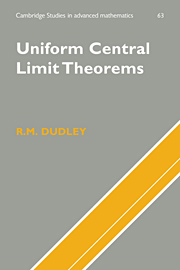Book contents
- Frontmatter
- Contents
- Preface
- 1 Introduction: Donsker's Theorem, Metric Entropy, and Inequalities
- 2 Gaussian Measures and Processes; Sample Continuity
- 3 Foundations of Uniform Central Limit Theorems: Donsker Classes
- 4 Vapnik-Červonenkis Combinatorics
- 5 Measurability
- 6 Limit Theorems for Vapnik-Červonenkis and Related Classes
- 7 Metric Entropy, with Inclusion and Bracketing
- 8 Approximation of Functions and Sets
- 9 Sums in General Banach Spaces and Invariance Principles
- 10 Universal and Uniform Central Limit Theorems
- 11 The Two-Sample Case, the Bootstrap, and Confidence Sets
- 12 Classes of Sets or Functions Too Large for Central Limit Theorems
- Appendix A Differentiating under an Integral Sign
- Appendix B Multinomial Distributions
- Appendix C Measures on Nonseparable Metric Spaces
- Appendix D An Extension of Lusin's Theorem
- Appendix E Bochner and Pettis Integrals
- Appendix F Nonexistence of Types of Linear Forms on Some Spaces
- Appendix G Separation of Analytic Sets; Borel Injections
- Appendix H Young-Orlicz Spaces
- Appendix I Modifications and Versions of Isonormal Processes
- Subject Index
- Author Index
- Index of Notation
Appendix D - An Extension of Lusin's Theorem
Published online by Cambridge University Press: 20 May 2010
- Frontmatter
- Contents
- Preface
- 1 Introduction: Donsker's Theorem, Metric Entropy, and Inequalities
- 2 Gaussian Measures and Processes; Sample Continuity
- 3 Foundations of Uniform Central Limit Theorems: Donsker Classes
- 4 Vapnik-Červonenkis Combinatorics
- 5 Measurability
- 6 Limit Theorems for Vapnik-Červonenkis and Related Classes
- 7 Metric Entropy, with Inclusion and Bracketing
- 8 Approximation of Functions and Sets
- 9 Sums in General Banach Spaces and Invariance Principles
- 10 Universal and Uniform Central Limit Theorems
- 11 The Two-Sample Case, the Bootstrap, and Confidence Sets
- 12 Classes of Sets or Functions Too Large for Central Limit Theorems
- Appendix A Differentiating under an Integral Sign
- Appendix B Multinomial Distributions
- Appendix C Measures on Nonseparable Metric Spaces
- Appendix D An Extension of Lusin's Theorem
- Appendix E Bochner and Pettis Integrals
- Appendix F Nonexistence of Types of Linear Forms on Some Spaces
- Appendix G Separation of Analytic Sets; Borel Injections
- Appendix H Young-Orlicz Spaces
- Appendix I Modifications and Versions of Isonormal Processes
- Subject Index
- Author Index
- Index of Notation
Summary
Lusin's theorem says that for any measurable real-valued function ƒ, on [0, 1] with Lebesgue measure λ for example, and ε > 0, there is a set A with λ(A) < ε such that restricted to the complement of A, ƒ is continuous. Here [0, 1] can be replaced by any normal topological space and λ by any finite measure μ which is closed regular, meaning that for each Borel measurable set B, μ(B) = sup{μ(F): F closed, F ⊂ B) (RAP, Theorem 7.5.2). Recall that any finite Borel measure on a metric space is closed regular (RAP, Theorem 7.1.3).
Proofs of Lusin's theorem are often based on Egorov's theorem (RAP, Theorem 7.5.1), which says that if measurable functions fn from a finite measure space to a metric space converge pointwise, then for any ε > 0 there is a set of measure less than ε outside of which the fn converge uniformly.
Here, the aim will be to extend Lusin's theorem to functions having values in any separable metric space. The proof of Lusin's theorem in RAP, however, also relied on the Tietze-Urysohn extension theorem, which says that a continuous real-valued function on a closed subset of a normal space can be extended to be continuous on the whole space. Such an extension may not exist for some range spaces: for example, the identity from {0, 1} onto itself doesn't extend to a continuous function from [0, 1] onto {0, 1}; in fact there is no such function since [0, 1] is connected.
- Type
- Chapter
- Information
- Uniform Central Limit Theorems , pp. 405 - 406Publisher: Cambridge University PressPrint publication year: 1999



